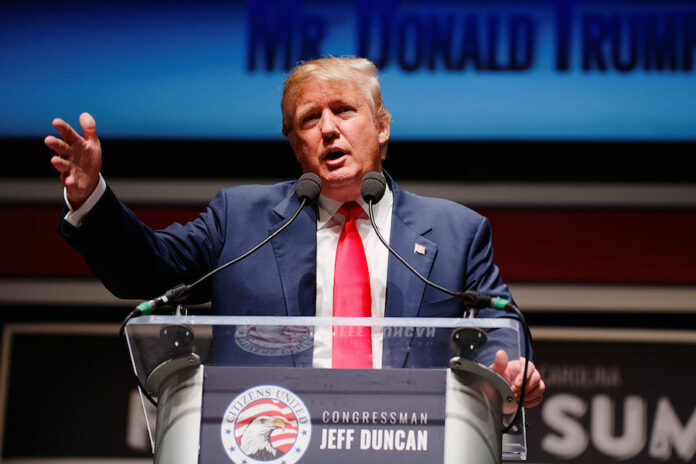![MICHAEL VADON [CC BY-SA 4.0] / CREATIVE COMMONS](https://theaggie.org/wp-content/uploads/2017/01/collapse_op.jpg)
 Partisan politics threaten the integrity, values of our country more now than ever
Partisan politics threaten the integrity, values of our country more now than ever
Here we are: the year that Donald J. Trump officially becomes President of the United States.
It’s no surprise that Trump’s inauguration next week has sent ripples of horror throughout the country. Trump reimagines, warps or simply disregards the truth — about the election results, about news stories, even about his own words — nearly on a daily basis. His Twitter feed abounds with temper tantrums that make me roll my eyes harder than 30 Rock’s Liz Lemon. To make matters worse, our President-elect cannot restrain himself from unleashing petty personal attacks on anyone who pokes holes in his flimsy lies.
Trump doesn’t understand — or just doesn’t care about — democratic values. He consistently threatens freedom of press, freedom of speech and the right to protest in his attempts to sustain the dense web of half-truths and full-lies in which he resides.
But our political system isn’t imperiled only by our President-to-be.
The Founding Fathers constructed a complex system of checks and balances that prevents egotistical demagogues like Trump from completely dismantling the United States government. But with the Republican Party now dominating both chambers of Congress and prioritizing party interest over intelligent decision-making, Trump’s undemocratic practices will likely remain unchecked.
Although many Republican leaders strongly opposed Trump during his campaign, almost all of them have now surrendered their moral consciences for partisan politics. Ted Cruz ultimately supported Trump despite previously calling him an “utterly amoral,” “pathological liar.” Mitt Romney was open to becoming Secretary of State in Trump’s Cabinet even after declaring that Trump’s ideas are “extraordinarily dangerous to the heart and character of America.” House Speaker Paul Ryan hasn’t criticized the President-elect since the election even though he initially condemned many of Trump’s policy proposals, even labelling Trump’s comments about the Indiana judge ruling against him in the Trump University fraud case as the “textbook definition” of racism.
Given that virtually every prominent GOP leader eventually bowed to Trump’s authority before the election, there’s little reason to believe that they will change their complacency during his presidency.
Some intra-party tension has already risen over issues like the Russian cyberattacks that manipulated the 2016 election with the goal of getting Trump elected. But most Republican members have either blithely accepted or fully embraced Trump’s unprecedented vision for the country, conceding to his lengthy list of inexperienced, unqualified and plutocratic Cabinet nominees, and seem prepared to accommodate Trump’s numerous conflicts of interest.
How far are party leaders and voters willing to go for the sake of advancing their party? How much further can Trump push the GOP toward right-wing populism before Republicans like Senator Ryan stop bending and start fighting for their true values? Is there ever a limit, or will the Republicans simply realign their entire party to fit Trump’s ideology?
Make no mistake: The party’s capitulation isn’t about preserving conservative principles like small government, free trade, constitutional rights and balanced budgets; it’s about maintaining power at any cost. Otherwise, why would a Republican governor unconstitutionally attempt to tear away power from an incoming Democratic governor in North Carolina, and why would House Republicans unexpectedly unite to eliminate an independent ethics panel in the dead of night?
James Madison, in Federalist Papers No. 10, calls for legislation to be “pass[ed] […] through the medium of a chosen body of citizens, whose wisdom may best discern the true interest of their country, and whose patriotism and love of justice will be least likely to sacrifice it to temporary or partial considerations.”
But we don’t live in an era of congressional leaders with a “true interest of [our] country” — we live in a time in which parties take precedent over the good of the nation. And unless we want to continue living according to the partisan lawmakers who undermine basic democracy, we must force our representatives to listen to our frustrations, fears and hopes. We need to be more vocal than ever throughout these next four years, or else we could witness our republic slip away.
Written by: Taryn DeOilers — tldeoilers@ucdavis.edu
Disclaimer: The views and opinions expressed by individual columnists belong to the columnists alone and do not necessarily indicate the views and opinions held by The California Aggie.





